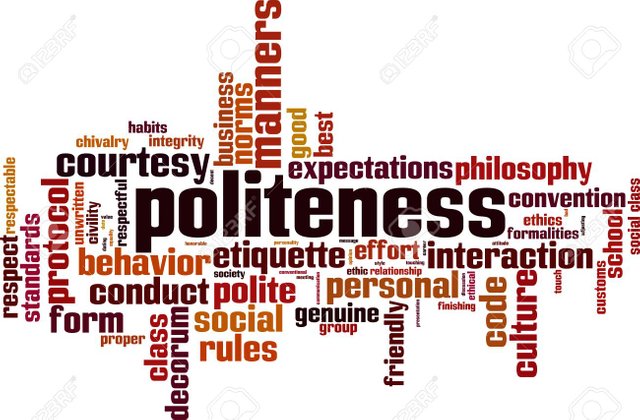"Politeness is to the mind what grace is to the face." François Marie Arouet, known as Voltaire, writer, philosopher (1694 - 1778)
Voltaire remarkably defines politeness as one of the moral virtues to which one indulges out of respect for others. Unfortunately, this quality is not found in everyone!

In short, the rules of politeness are the beginnings of good manners. Politeness is a small thing, which prepares for great. These are the codes of good manners and good manners. These are the codes of behavior that help create social harmony.
These are the codes that also define what is allowed or prohibited in certain situations. These are the codes which dictate the obligations of each one towards the social hierarchy, which define the respect of the young people or the adults towards the elderly, the disabled, pregnant women. Alas, these codes of good manners are no longer found in everyone!
Some will say that politeness breaks the rule that we are authentic and frank. “Too polite to be honest,” they say.
Why do you have to say "thank you" if you don't want to? Why not strive for authenticity and respond frankly to a stranger who has stepped on us? Why not reply to this boor: "Look where you put your feet, idiot!"?
When you step on the feet of a stranger, unintentionally of course, is it better to lie to him while pretending to be really sorry, while he is laughing heartily at his pain?
So politeness, even if it is essential, is sometimes akin to real hypocrisy. A person who, out of habit or education, says "Are you okay?" to people crossed, while deep down she doesn't give a damn; or a child who says: "she is ugly the lady" or another who says: "he is stupid the man" when an adult can think it, but if he is well educated, will never or hardly ever say it .
True politeness of the heart admits only sincerity. It is guided by human values. The presence or absence of these values could explain this indifference, this contempt. Make no mistake, politeness of the heart is the source of feelings that lead us to sympathize with a person or on the contrary to avoid him. Nowadays, politeness of the heart is more and more absent in social relations.
I have shaken hands with people I don't count among my friends, and in this case my feeling towards them is more indifference than dislike! And yet, I am tolerant even of those who disturb me. There are people who we find sympathetic at first glance, while others only inspire us with coldness.
Politeness, in these circumstances, is it not a kind of hypocrisy required to flatter some and charm others? Doesn't it encourage disrespect for oneself? Doesn't politeness ultimately lead to authenticity?
The expression that appearances are deceptive is commonly used, which means that the real is not what appears.
Politeness is a set of rules acquired through education. The rules of politeness are almost obligatory, because without them, there is no civility. Our relationships with others would be continually poisoned by strong reactions, without restraint. The rules of politeness aim to soften manners. In short, the rules of politeness are the beginnings of good manners. These rules facilitate social relations and respectful exchanges between individuals.
The rules of politeness are seen as fundamental principles on which the rest is built. It is a combination of discretion, tact, friendliness, complacency, which puts so much charm in human relations. It is knowing how to present yourself in a society, to speak and to be silent at the right time. Punctuality is an essential act of good manners. Speaking loudly is also frowned upon. This is called savoir-vivre.
Politeness oils the social cogs and makes life more pleasant. It is a tacit exchange of good practices. Know-how complements savoir-vivre. Sometimes, without saying anything, just a sincere smile and we show politeness.
Good manners are the art of living with respect for oneself, as much as with respect for others. The observation of this principle still seems valid to me. Neither globalization nor new technologies have upset the codes of decorum.
The best proof of respect that I can give to the intelligence of the reader is to let him reflect on my theme "politeness is a quality always appreciated".